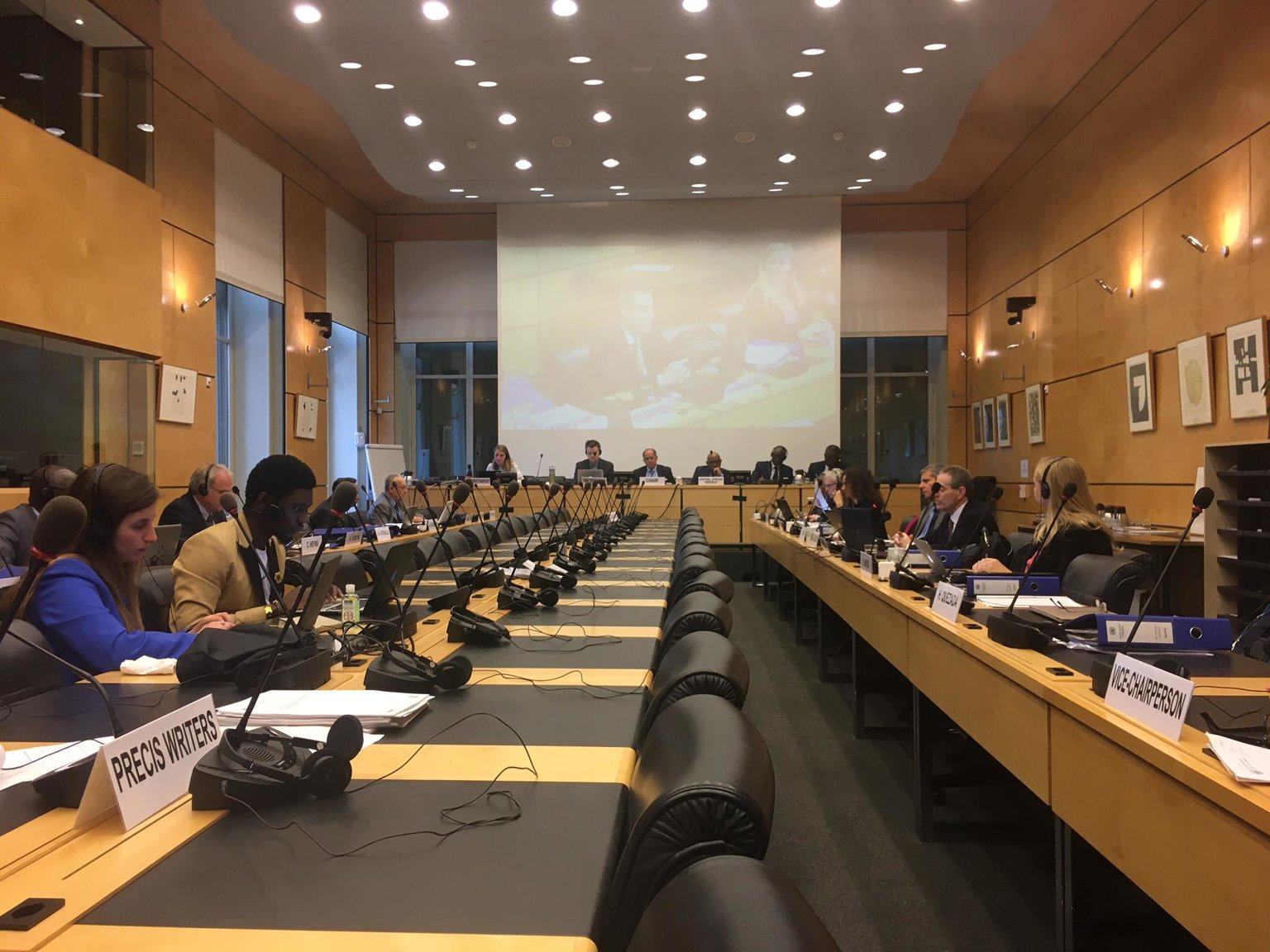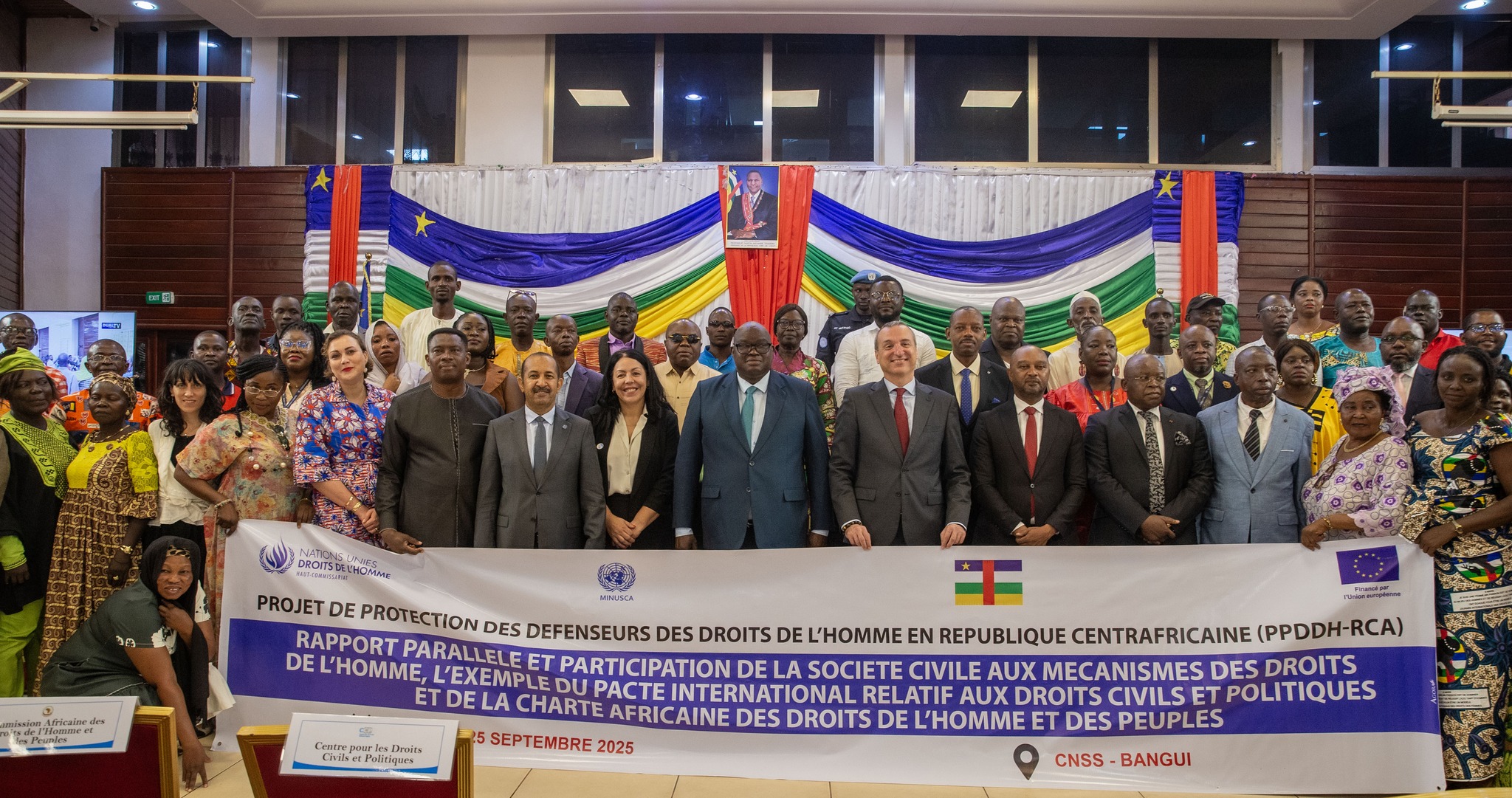The Central African Republic: Consideration of a Country in Crisis
Published on 20 Mar 2020, 08:00 AM
Human Rights Committee - 128th session - March 2020
 The Committee considers the Central African Republic's response
The Committee considers the Central African Republic's response
The Central African Republic ratified the ICCPR in 1989 but was only most recently considered in 2005 - for its second periodic report to the Human Rights Committee. The excessively long period between these considerations is perhaps best attributed to the re-occurrence of considerable crises within the State Party - which has been subject to an ongoing civil war since 2012. As such, the third periodic report under consideration was also not completely without the constraints conventionally associated with an unstable political climate - as armed groups currently control a notable 80% of State territory.
Against this tumultuous backdrop, and as the Committee sought to emphasize, the consideration of the State under Review was perhaps most meaningfully summarized as the question of “how can human rights be effectively protected during a period of crisis? And, how can all stakeholders be involved in ensuring that they live up to their commitment to human rights?” - rather than an unwavering critique of the State Party’s relative adherence to various human rights instruments.
In its opening statement the Central African Republic outlined its state of crisis and emphasized the humanitarian catastrophe and the armed rebellion that almost caused the state to cease to function in 2015. It admitted to the mass-existence of gross human rights violations in rebel-controlled areas of the country, but stressed that a culture of human rights and the rule of law are a necessary precondition for peace.
The Human Rights Committee dwelled into issues of impunity, the death penalty, female genital mutilation (FGM), reporting obligations, the existence of a comprehensive anti-discrimination framework, freedom of religion, discrimination against women, the Special Criminal Court, and abortion - among others. In what follows, three of these issues will be outlined in greater detail: (1) impunity, (2) gender-based violence, and the (3) death penalty.
"We are not a failed state but we are a state that does not have the conditions you described [in relation to women’s rights]. We have other priorities today - our priority is security - sufficient food, and sufficient places to sleep. It is not that we reject them, but that there is a hierarchy. "
- Head of Delegation, CAR
Impunity
Perhaps unsurprisingly, impunity in relation to human rights violations was the most prominent issue of the Central African Republic’s third consideration. Concerns were primarily addressed in two-fold: in relation to the Special Criminal Court and in relation the de facto amnesty granted to rebel commanders. In terms of the Special Criminal Court, the Human Rights Committee expressed concerns about the allocation of a sufficient budget, the appointment of sufficient staff, and its results. In terms of rebel commanders, the Committee noted that their continuous appointment to high posts in administrative bodies has effectively blocked any processes against them - which may arguably be described as a disguised form of amnesty. The Human Rights Committee expressed grave concerns that this apparent impunity towards grave human rights violations helps uphold the “infernal cycle of violence, and continuous human rights violations” that has marked the country over the recent years.
In its response, the State argued that it had appointed all the necessary judges - but, to date, not all recruited staff have taken up their posts. It also noted that the Court has an operational budget, but that this was funded by the international community - and that, admittedly, there has been an apparent deficit in its allocation. However, it also emphasized that the Special Criminal Court continues to carry out its work autonomously and independently, and “in time each and every person will have to answer for their crimes”. It failed to substantively touch upon the issue of de facto amnesty granted through recruitment.
Female Genital Mutilation (FGM)
Turning to the issue of gender-based violence in CAR, the Human Rights Committee expressed concerns over the continued prevalence of FGM - despite its prohibition under the Criminal Code. Indeed, according to a UNICEF report, nearly one quarter of all women and girls have experienced FGM within the Central African Republic. It requested further information on the number of prosecutions that had occurred vis-a-vis the crime, and noted that very few people have lodged complaints with the authorities. The Committee thus asked for information about the existence of awareness raising programmes and training for law enforcement officers.
The State, in its response, emphasized that it remains difficult to establish statistics in relation to gender-based violence given the socio-cultural burden placed upon victims - as social stigmatization makes victims reluctant to bring cases forward. However, they noted that awareness raising work is under way to change these views - in particular, through the strong involvement by the association of women lawyers. The delegation also noted that there is a joint rapid response unit whose role it is to facilitate procedures and trial processes for victims. It also noted that there is training provided to judges for gender-based violence - with a curriculum of 2-3 different thematics.
Death Penalty
The Human Rights Committee noted that although the death penalty has yet to be abolished, judges do not seem to use it in practice - constituting a de facto moratorum on capital punishment. However, it noted that despite the stated commitment of the State party to abolition, it failed to provide any probable date or timeline regarding the execution of the abolishment process.
In responding, the State metaphorically reflected that a law is a mirror of the population and that you cannot pass a law that does not reflect the population. This, the state delegation argued, is particularly acute following conflict- with the population desiring far-reaching justice for the violations and trauma they have experienced. The Committee challenged this statement on the basis that awareness-raising campaigns could still be enacted to change such views. The State responded that as long as the population has to seek refuge and faces violence, such efforts are not an immediate concern - however, this does not mean the state is not committed towards the eventual abolition of the penalty.
Priority Recommendations
The State party is requested to provide, by 20 March 2022, information on the following recommendations from the Committee’s Concluding Observations:
National Human Rights Institution
The State Party should
- Ensure that the National Commission on Human Rights and Fundmental Freedoms is allocated sufficient resources to enable it to fulfill its mandate in an independent mannner.
- Ensure that it has offices and resources enabling effective action across the country, while taking into account the security situation in some parts of the country. The Committee encourages the State to take advantage of the MINUSCA technical support to do this.
- Take all necessary measures to make the national human rights institution operate in conformity with the Paris Principles.
Fighting Impunity
With reference to the previous concluding observations, the State should:
- Ensure that all victims have access to effective remedy, including before the Special Criminal Court, so that they can benefit from adequate measures of compensation, restitution, and rehabilitation, taking into account the principles and guidelines concerning the right to remedy and redress for victims of grave violations of international human rights law and serious violations of international humanitarian law
- Make the Commission of Truth, Justice, Repatriation, and Reconciliation operational as soon as possible, and ensure that it works in a inclusive, efficient, and independent manner in line with the standards of international law, in particular by prohibiting any amnesty for grave violations of international human rights law and serious violations of international humanitarian law.
- Strengthen background check measures to prevent persons accused of violations of the Convenant from exercising public functions and recieving promotions.
Right to Life and the Protection of the Civilian Population
The State Party should address the high number of allegations of extrajudicial killings committed by non-state actors. In particular, the State should:
- Accelerate measures aimed at disarming and demobilizing armed groups
- Ensure that allegations of extrajudicial killings and other serious human rights violations are thoroughly investigated, and that all such perpetrators are prosecuted and sanctioned in a manner corresponding to the gravity of such acts.
- Shed light on the acts of accused African Union peacekeepers in Boali so that victims may obtain truth and repatriation for these crimes.
- Strengthen efforts to shed light on reprisals and killings for witchcraft.
 The Committee considers the Central African Republic's response
The Committee considers the Central African Republic's response



